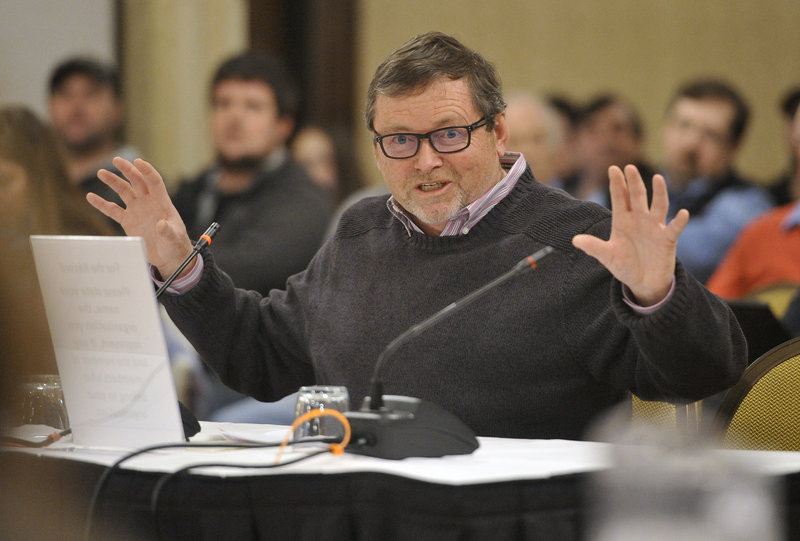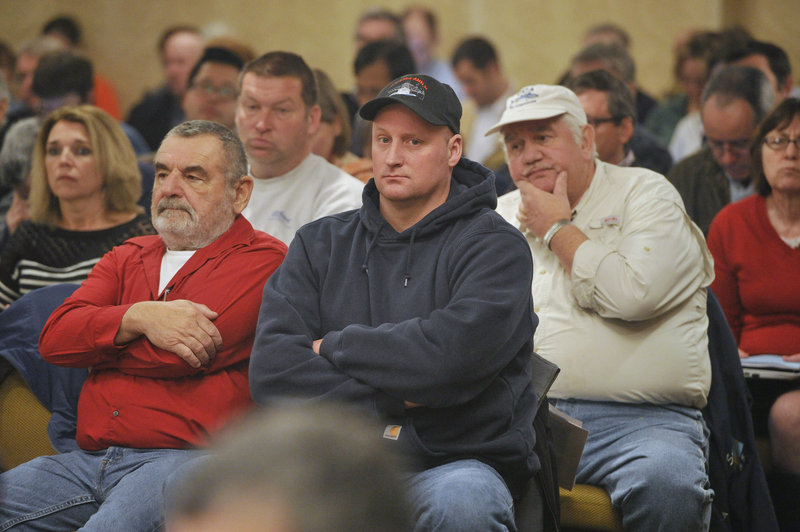PORTSMOUTH, N.H. – Fishermen say drastic catch limits endorsed by regulators Wednesday will destroy New England’s groundfishing industry.
In its most dramatic move yet to protect dwindling stocks of cod, the New England Fishery Management Council passed a 77 percent reduction in the catch limit for Gulf of Maine cod.
The council’s decision, which is expected to be backed by the National Oceanic and Atmospheric Administration, cuts the annual catch for Gulf of Maine cod to 1,550 metric tons for the next three years, down from 6,700 metric tons in the past year.
The council also approved a cut of 55 percent for cod on Georges Bank, to 2,506 metric tons a year for three years.
The catch limits are set to take effect May 1, the start of the 2013 fishing year.
“This ruling will put many fishermen out of business,” said Angelo Ciocca, president of Nova Seafood in Portland and part-owner of a few fishing vessels. “This is the end of the Gulf of Maine fishing industry. It’s a sad day for New England, it’s a sad day for fishing and it’s a sad day for the country.”
Fishermen who attended the hearing held by the fishery management council Wednesday said the limits are based on flawed science.
Paul Vitale, who fishes off Gloucester, Mass., said he would rather see the groundfishing industry shut down while studies are done than let it limp along with severe catch limits.
“The economic disaster that’s coming doesn’t need to happen,” he said. “I’ll be going bankrupt. That’s the plan.”
Chris Chadwick, who fishes off Gloucester and Marblehead, Mass., said reducing the cod quotas hurts his family.
“All I’m trying to do is support my family. Reducing the quotas reduces my child’s ability to go to college,” said Chadwick, who said his family has been fishing since 1860. “What job out there today is going to support my family?”
The sharp reduction in catch limits has created significant tension between fishermen, scientists and regulators who are struggling to rebuild fisheries that are central to New England’s history and economy.
Ben Martens, manager of the Port Clyde sector and executive director of the Maine Coast Fishermen’s Association, said fishermen are understandably worried, but all involved know that something must be done.
“The stocks aren’t there, based on what they are seeing,” Martens said.
Maggie Raymond, executive director of the Associated Fishermen of Maine, a trade association of 25 active fishing vessels plus supporting industries, said regulators have to worry about the long-term picture as much as the short-term.
“In the short term, fishing communities will suffer from the reductions,” Raymond said. “If the collective goal is to rebuild stocks … then if we don’t start looking at the causes of the problem, we are not going to find a solution.”
Raymond said offshore vessels that make multi-day trips may have more options by fishing for species such as pollock or red fish, but those fish often fetch lower prices than cod, making it difficult to cover a boat’s expenses.
“It’s difficult to see how you’re going to cover $3.50-a-gallon gas if you’re getting a 60-cent return on pollock,” Raymond said. “I don’t know what these men are going to do for other work.”
The Associated Press reported that the new limits on cod will prevent fishermen from landing more plentiful species, such as haddock and pollock, because fishermen can’t pull up those healthier groundfish without catching too much of the cod that swim among them.
The council did decide Wednesday to increase the catch limit for southern New England mid-Atlantic winter flounder by 168 percent, to 1,676 metric tons a year.
Supporters of the catch reductions said they are needed to preserve fish stocks and the long-term future of the industry.
“This is your best available science, and science consistently overestimates biomass,” said Peter Shelley, senior counsel for the Conservation Law Foundation, during public testimony before the final vote. “There is no biological hope on the horizon.”
The council considered a proposal to close the Gulf of Maine to groundfishing, but voted 16-0 against it, with one abstention.
As recently as 1990, an estimated 350 Maine-based vessels, supporting thousands of offshore and onshore jobs, spent at least part of their time hunting groundfish.
Those vessels hauled in more than 15 million pounds of Atlantic cod alone that year, and millions more pounds of other bottom-dwelling species, according to statistics from the Maine Department of Marine Resources.
Cod and other species then plummeted, due in no small part to overfishing. The result was ever-tightening catch limits.
By 2011, the 40 to 45 vessels remaining in Maine hauled in just 750,000 pounds of cod. The 5 million total pounds of groundfish landed in Maine that year was valued at roughly $5.7 million, compared with a lobster catch valued at $334.6 million.
The groundfish industry pulled in a total of about $90 million in 2011.
Last year, the U.S. Department of Commerce designated the northeastern groundfishery an “economic disaster,” clearing the way for emergency federal funds to help support the industry, research programs or management practices.
But Congress has yet to appropriate any money.
U.S. Rep. Chellie Pingree released a prepared statement Wednesday night saying, “There is no question that these catch limits are going to be devastating to fishermen in Maine. This is why a fisheries disaster was declared last year and it just makes it even more outrageous that Congress has refused to approve disaster funding for the fishermen who are being hit hard by these cuts.”
Pingree is married to S. Donald Sussman, majority owner of the Portland Press Herald.
Some fishermen said Wednesday that they won’t fish under the new limits because it would be unprofitable.
Robert Dunne of Gloucester said he will look for a new job and try to learn new skills.
“I want a state job. A government job,” he said. “We have to adapt.”
Jessica Hall can be contacted at 791-6316 or at:
jhall@pressherald.com
Send questions/comments to the editors.




Comments are no longer available on this story